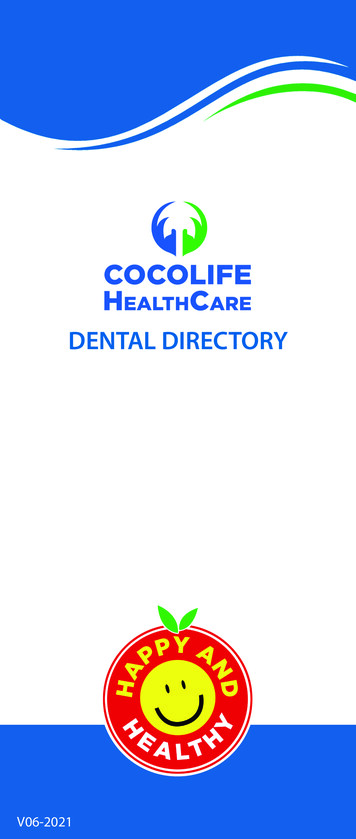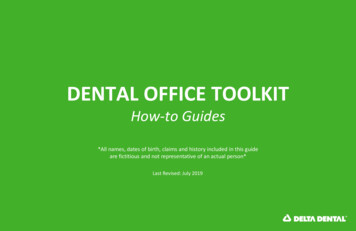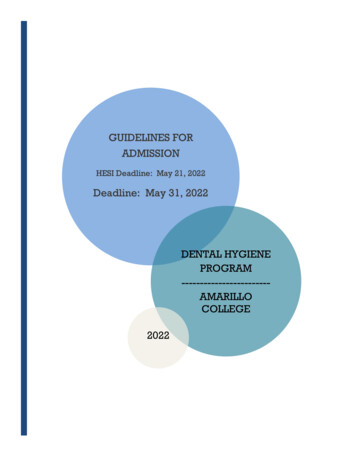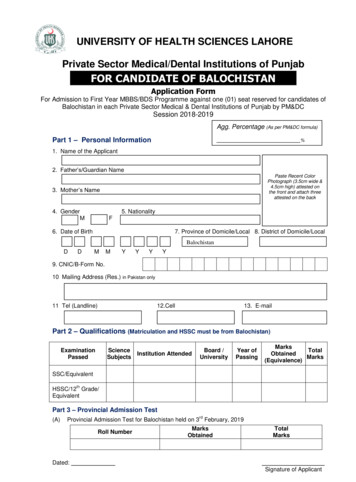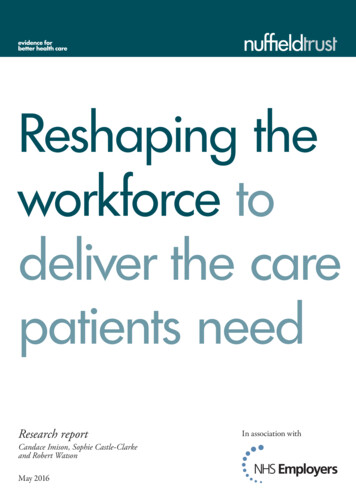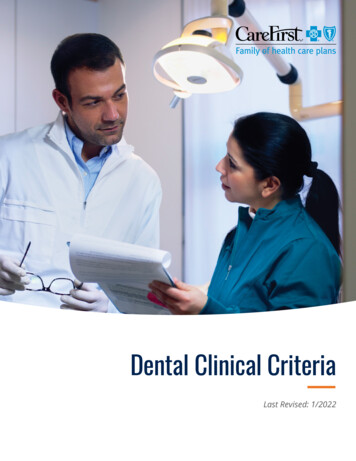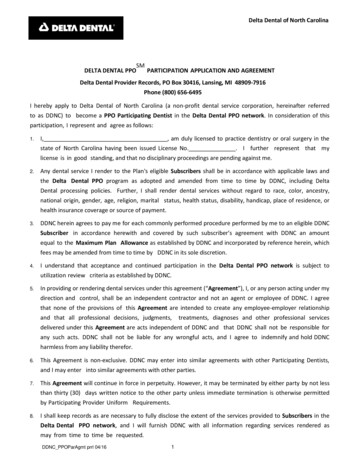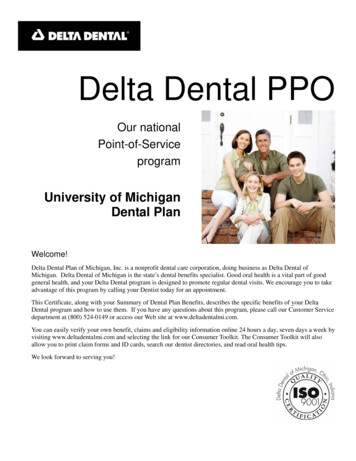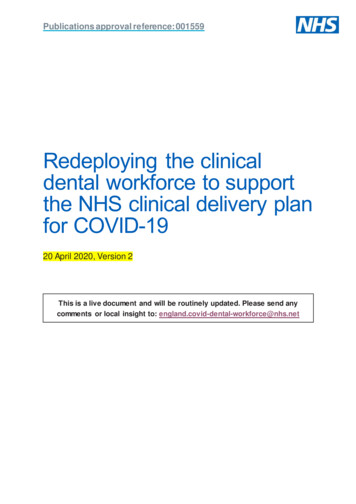
Transcription
Publications approval reference: 001559Redeploying the clinicaldental workforce to supportthe NHS clinical delivery planfor COVID-1920 April 2020, Version 2This is a live document and will be routinely updated. Please send anycomments or local insight to: england.covid-dental-workforce@nhs.net
Contents1. Background and definitions . 12. Principles . 33. Key considerations . 44. Redeployment pathway . 65. Workforce landscape . 76. Key stakeholders . 87. Competencies and mapping potential roles . 98. Indemnity . 139. Remuneration considerations . 1410. Induction. 15Appendix 1: Transferable competencies . 16Appendix 2: Questions and answers for volunteers . 18Appendix 3: Self-assessment competency checklist . 26
Background and definitionsThe dental workforce in the UK constitutes over 33,000 dentists and almost 58,000DCPs registrants in England.1 With the coronavirus (COVID-19) pandemic and thepostponement of elective dental care, this multi-skilled workforce could be used forincreasing surge capacity, as well as ensuring effective resilience across the healthand social care system. The dental workforce has a wide range of skills andexperience that can be used to undertake activities that will help clinical colleaguesand the wider workforce during COVID-19. This document sets out the principles ofsafe redeployment and healthcare delivery as critical care units prepare and deliverincreased activity during surge2 and super-surge3 in the coronavirus pandemic.It is expected that the clinical dental workforce can be used to free other roles withinthe health and social care system and help maintain the delivery of other noncoronavirus related essential services. Strategically redeploying the dental workforcebased on needs will maximise the effectiveness of the existing healthcare workforce,as well as increase capacity where the need is the greatest. Some of the dentalworkforce may still be required to maintain urgent and emergency dental careaccess. It is crucial that this is maintained, to reduce pressures on emergencydepartments.For non-clinical members of the dental team, there are numerous, valuable localcommunity volunteering efforts that will help vulnerable members of society. Thesedental team members have a wide range of skills that can be used during this time ofcrisis to support the wider workforce.While the list in this document is not exhaustive, it provides potential job roles wherethe clinical dental team may be able to redeploy their skills within their competency.Redeployment will be locally determined. Individual trusts will have their owninduction and job specifications and the demand for certain roles will vary dependingon locality. The GDC has made clear that it fully supports members of the dental1Gallagher, J. The Future Oral and Dental Workforce for England. Liberating human resources toserve the population across the life-course. 2019.2Surge: increased activity supported by reducing other routine activity (eg elective/non-urgent surgeryand outpatient appointments. This will operationalise operating theatres, recovery wards and similarareas to provide critical care for an increased number of patients.3Super-surge: increased activity which requires ‘normal’ wards to be converted into critical care units.This will require additional resources to be provided to hospitals: hardware (eg ventilators andmonitors), oxygen, consumables and staff. Extra beds may be created through partnership withindependent sector hospitals or setting up new field hospitals.1Redeploying the Clinical Dental Workforce to Support the NHS Clinical DeliveryPlan for COVID-19, Version 2
team taking on roles outside normal dental practice, but individuals must ensure theywork to the limits of their competency, in accordance with GDC standards.2Redeploying the Clinical Dental Workforce to Support the NHS Clinical Delivery Planfor COVID-19, Version 2
PrinciplesSafe for staff and patients Redeployed dental team members should work to the limits of their usualframework of competence and experience but may have to work outside theirusual teams and hierarchies. Competencies have been mapped to specific roles, requiring support duringsurge. Individuals should undertake a self-assessment to ensure theircompetence meets the required role. Please see Appendix 3. Dental team members should not be removed from roles which would leaveurgent dental services understaffed. The hospital dental workforce should place themselves firstly at the disposal oftheir trust’s medical director for redeployment. Universities remain open thereforeAcademic dentists should be directed to the most effective role by theirDean/Head of School in the first instance. Those available for redeploymentshould let their hospital colleagues be put at the disposal of their trust’s medicaldirector. Redeployed dental team members may be at increased personal, physical ormental health risk because of their lack of experience in their new workingenvironment. Induction and orientation will be key, as well as assigning adesignated contact person.3Redeploying the Clinical Dental Workforce to Support the NHS Clinical Delivery Planfor COVID-19, Version 2
Key considerations1. Dental professionals will register their note of interest via the onlinequestionnaire.2. There will be no obligation for any member of the dental workforce to provideservices. This will be on a voluntary basis.3. Expressions of interest will be triaged based on multiple factors includingrecognised competencies, level of experience and geographical location.4. Consideration to competence and supervision will feature as part of anyassessment.5. Once triaged appropriately, the information will be shared with relevantregional teams.6. Regional teams will recruit staff according to demand/operational needs.7. Regional teams will provide necessary and identified training needs, based onlocal requirements.8. Dental team members will be used to meet surge demand, within their scopeof practice.9. Dental team members will be expected to inform their indemnity organisationsof any changes in their roles. You may be asked to carry out activities whichare not currently part of your remit.10. Individuals will need to know what roles they will be expected to carry out andhow they will be deployed. When they are already employed, volunteers willneed to know how to notify their employer and be made aware of theemployment protections they will receive in respect of the leave.11. Finances: compensating individuals for some loss of income and expenses isan important factor in ensuring that enough volunteers come forward.Maximising success will be aided by identifying and agreeing an appropriaterate of compensation and a simple means for individuals to claim. Thosevolunteers from a wholly private or mixed NHS background should not bedisadvantaged by volunteering. Arrangements for remunerating individuals will4Redeploying the Clinical Dental Workforce to Support the NHS Clinical Delivery Planfor COVID-19, Version 2
take into account support that NHS England and NHS Improvement haveprovided to the sector.12. The government has committed to indemnity not being a barrier for staff whowork in alternative settings during the coronavirus pandemic. Existing stateschemes – the Clinical Negligence Scheme for Trusts (CNST) and ClinicalNegligence Scheme for General Practice (CNSGP) – or emergency clinicalnegligence indemnity arrangements will cover staff working in alternativesettings. The Coronavirus Act 2020 gives the Secretary of State powers toprovide indemnity for clinical negligence liabilities arising from NHS activitiescarried out for the purposes of dealing with, or in consequence of, thecoronavirus outbreak, where there is no existing indemnity arrangement.13. As part of redeployment, consideration should be given to previousexperience and site familiarity. Focused induction should occur as a priority sothe redeployed workforce is prepared.14. It is likely that there will be high sickness rates and staff will be stretchedbeyond their usual working practices. It is also recognised that workingoutside usual systems is stressful and sometimes extreme circumstances willimpact on wellbeing and staff morale. Local support mechanisms should bedeveloped as a priority.15. The trust or organisation to which dental team members are deployed will berequired to undertake appropriate identity checks and provide a contract inline with current local arrangements. The contract will need to reflect workinghour protections, pay arrangements, annual leave entitlement and inductionsthat are provided to new staff.5Redeploying the Clinical Dental Workforce to Support the NHS Clinical Delivery Planfor COVID-19, Version 2
Redeployment pathway6Redeploying the Clinical Dental Workforce to Support the NHS Clinical Delivery Planfor COVID-19, Version 2
Workforce landscapeThe dental workforce constitutes a mix of both public and private sectorprofessionals. Most of the dental workforce works in primary dental care (85%)4 ingeneral dental practice. The earnings for most dentists, dental therapists and dentalhygienists are mainly from self-employment. Others work in salaried positions withinthe community and hospital dental services, as well as in postgraduate training roles.This salaried cohort can be rapidly redeployed locally as deemed appropriate bytrusts as they are already employed. Currently, there are 11 dental schools inEngland. There are 11,000 dental practices in England of which approximately 8,348hold NHS General Dental Service contracts.Table 1: General Dental Council registered clinical dental workforce inEngland5Registrant typeOrthodontic therapistCount589Dental nurse47844Dentist33094Dental hygienist6424Dental therapist3124Clinical dental technician335Dental technician48234General Dental Council, Preparing for Practice, Dental Team Learning Outcomes for Registration,2015.5General Dental Council. Registration Report March 2020.7Redeploying the Clinical Dental Workforce to Support the NHS Clinical Delivery Planfor COVID-19, Version 2
Key stakeholders8 British Dental Association Care Quality Commission Dental Schools Council Dental professional bodies Department of Health and Social Care General Dental Council and General Medical Council Health Education England Indemnity organisations Public Health England NHS Business Service Authority NHS England and NHS Improvement NHS trusts Royal colleges and specialist societiesRedeploying the Clinical Dental Workforce to Support the NHS Clinical Delivery Planfor COVID-19, Version 2
Competencies and mapping potentialrolesRegistrants will need to make a considered judgment about whether they are trainedand competent.6Local induction and training may be required for use of systems, templates andalgorithms.The expectation is for the dental workforce not to be deployed to roles that requireadditional training in the form of new qualifications or would require a high level ofsupervision.Table 2: Key for training and supervisionLOWMODERATEMinimum additional training requiredUp to 3 days training requiredTable 3: Competencies and mapping of potential rolesSectorA&EJob listWho can do thisPatient history takingDentistDental therapistDental triage (with referral Dentist/DCPsto appropriate urgentdental care centre orOMFS if necessary)Dental prescribingDentistTraining need SupervisionlevelNoneNoneNoneNoneNoneNoneKeeping medical records Dentist/DCPsNone(paper and computer)Talking to patients andDentist/DCPsNonerelativesJob listWho can do this Training needCannulationSedationdentist and/ordentist that hasNoneNoneNoneSupervisionlevelNone6Responding to COVID-19: providing treatment in uncertain time, GDC 26 March treatment-in-uncertain-times9Redeploying the Clinical Dental Workforce to Support the NHS Clinical Delivery Planfor COVID-19, Version 2
PhlebotomySuturingCriticalcareDentist with additionalskillsWound dressingsDentist/DCPsWound caretrainingBlood ionReception/administrative DCP/dentalSystemsdutiesreceptionisttrainingPatient observations (O 2 Dentist/DCPsNational Earlysaturations, bloodWarning Scoringpressure monitoring,systemrespiratory rate, heartrate)‘Specialing’ (prolongedDentistLocally tailoredclose observation) oftrainingpatients in certainsituationsLearning and performing Any member ofAs requirednew tasks as requireddental teamPatient nulation in thepast two yearsSedation dentistNoneNoneNoneLowLowLowLowModerateAs requiredNoneNoneNoneMouth careAny member ofdental teamDentist/DCPsNoneNoneRecord observationsDentist/DCPsNoneAudit/research dataAny member ofdental teamLocally tailoredtrainingNoneJob listWho can do this Training needNote-takingDentist/DCPsNonePressure areasobservationDentist/DCPsLocally ying the Clinical Dental Workforce to Support the NHS Clinical Delivery Planfor COVID-19, Version 2
GeneralhospitalGeneralmedicalpracticeDressings careDentist/DCPsRange of movementexercise afterassessment by, andunder advice of, aphysiotherapistResult ntistDentist/DCPsLearning and performing Any member ofnew tasks as requireddental teamHousekeepingAny member ofdental teamWound caretrainingLocally ocally tailoredtrainingAs requiredLowNoneNoneLowLowLowAs requiredTalking to patients andrelativesAny member ofdental teamNoneNoneHealthcare assistantdutiesDentist/DCPsNoneLowTransport servicesAny member ofdental teamNoneLowLearning and performing Any member ofnew tasks as requireddental teamAs requiredAs requiredDecontamination/infection Dentist/DCPscontrol of surgeriesPhlebotomySedation-traineddentistPatient observations (eg Dentist/DCPsblood glucosemonitoring)Administrative dutiesAny member ofdental teamImmunisations andDentist/DCPsvaccinationsPatient ImmunisationLowtrainingSystemsLowtrainingJob listWho can do this Training need SupervisionlevelLearning and performing Any member ofAs requiredAs requirednew tasks as requireddental teamAmbulance ‘Buddy' to teamDCPsNoneNoneserviceDecontamination of units DCPsNoneNone11Redeploying the Clinical Dental Workforce to Support the NHS Clinical Delivery Planfor COVID-19, Version 2
Stocking of unitsNHS 111SocialcareLearning and performing Any member ofnew tasks as requireddental teamDental emergency triage Dentist/DCPsLearning and performing Any member ofnew tasks as requireddental teamSocial interactionAny member ofdental teamDelivery of medicinesAny member ofdental teamDelivery ofAny member offood/necessitiesdental teamCleaningAny member ofdental teamWork with single point of Any member ofaccess for social caredental teamtelephone advice,guidance around systemFollow-up calls aftertransition from admissionLearning and performingnew tasks as requiredCOVID-19 This is a potential futuretestingworkforce needLearning and performingnew tasks as required12DCPsAny member ofdental teamDentist/DCPsAny member ofdental teamLocalNoneinduction/manualhandlingAs requiredAs requiredSystemstrainingAs requiredLowNoneNoneNoneNoneNoneNoneNoneNoneAs requiredNoneAs requiredAs requiredCOVID-19testing trainingAs requiredModerateAs requiredAs requiredRedeploying the Clinical Dental Workforce to Support the NHS Clinical Delivery Planfor COVID-19, Version 2
IndemnityArrangements are in place to indemnify healthcare workers and others for clinicalnegligence arising from the NHS work they already do, through state indemnityschemes operated by NHS Resolution on behalf of the Secretary of State for Healthand Social Care.During a pandemic, existing indemnity arrangements will continue. The ClinicalNegligence Scheme for Trusts (CNST) will also cover dentists and DCPs who areredeployed to work for NHS trusts, and the Clinical Negligence Scheme for GeneralPractice (CNSGP) will cover dentists and DCPs who are redeployed to work forgeneral practices undertaking normal NHS contracted work.These arrangements should cover existing dentists and DCPs for the vast majority ofNHS services. However, we recognise that there will be a need for changes toworking arrangements during this emergency period. We do not want indemnity tobe a barrier to such changes. Through the Coronavirus Act 2020, the governmenthas therefore introduced additional powers to provide indemnity coverage for clinicalnegligence liabilities that may arise when healthcare workers and others are workingas part of the COVID-19 response, or undertaking NHS work to backfill others, in theevent that existing arrangements (CNST, CNSGP or individual arrangements) do notcover a particular activity.13Redeploying the Clinical Dental Workforce to Support the NHS Clinical Delivery Planfor COVID-19, Version 2
Remuneration considerationsMembers of the dental workforce who are not on a trust payroll or part of the GDScontract will need reassurance that their roles will be remunerated.Foundation dentists, although employed by primary dental care practices, aresalaried and will continue to be salaried by dental practices throughout anydeployment process.NHS England has agreed to continue to make monthly payments in 2020/21 to allpractices that are equal to one-twelfth of their current annual contract value. As partof the funding package, the NHS encourages dental practices to support theredeployment of professionals and staff working in general dental services tounderpin the wider NHS response, as is happening across the rest of the NHS.For staff who are not currently employed in the NHS (private-only dental providers orreturners), the time for which they are redeployed into acute or community settingswithin the NHS will be paid at the appropriate pay scale for their role, reflecting theskills and training required for their specified COVID-19 role. The actual amount willbe confirmed by the COVID-19 employing trust. Your contract will reflect standardterms and conditions such as working-hours protections, pay arrangements andannual leave entitlement.For staff in UDA-funded dental practices, further guidance will be providedseparately to recognise the nature of various funding streams that underpin mostNHS dental practices.14Redeploying the Clinical Dental Workforce to Support the NHS Clinical Delivery Planfor COVID-19, Version 2
InductionHealth Education England has developed training and induction modules to help thehealthcare workforce respond to COVID-19. These modules are useful to aidupskilling of the workforce and prepare for redeployment. Please see online trainingmodules here.All deployed workforce members will also be provided with orientation and inductionat a local level, to ensure they are fully prepared and supported in unfamiliarsettings. Employers and service providers remain responsible for making sure theredeployed workforce is competent for its role and is appropriately inducted, trainedand supervised.15Redeploying the Clinical Dental Workforce to Support the NHS Clinical Delivery Planfor COVID-19, Version 2
Appendix 1: TransferablecompetenciesThe dental workforce must be allocated to tasks according to their competency andskill set, as set out below. All GDC-registered dental team members should haveachieved the following competencies on registration.Dentist 7Obtain, interpret and record an accurate history that incorporates appropriate dental,medical (including medication history and allergies), social, demographical, cultural,nutritional, psychological and genetic factors.Recognise the signs of abuse or neglect in vulnerable groups and the local procedures thatshould be followed when reporting such circumstances.Generate a differential diagnosis and treatment/management plan based on evidence froman oral health assessment/urgent care assessment and risk screening, through t he correctinterpretation of clinical findings.Implement, perform and manage effective decontamination and infection control.Identify, assess and manage medical emergencies.Safely and appropriately prescribe and administer medicines and therapeutic a gents.Keep clinical records (conventional and or electronic) in line with current national guidance.Undertake relevant special investigations and diagnostic procedures, including radiography.Dental hygienist and therapistObtain, interpret and record an accurate history that incorporates appropriate dental,medical (including medication history and allergies), social, demographical, cultural,nutritional, psychological and genetic factors.7General Dental Council: Preparing for Practice, Dental Team Learning Outcomes for Registration,2015.16Redeploying the Clinical Dental Workforce to Support the NHS Clinical Delivery Planfor COVID-19, Version 2
Recognise the signs of abuse or neglect in vulnerable groups and the local procedures thatshould be followed when reporting such circumstances.Generate a differential diagnosis and treatment/management plan based on evidence froman oral health assessment/urgent care assessment and risk screenin g, through the correctinterpretation of clinical findings.Implement, perform and manage effective decontamination and infection control.Identify, assess and manage medical emergencies.Keep clinical records (conventional and or electronic) in line with current national guidance.Dental nurse8Identify, assess and manage medical emergencies.Implement, perform and manage effective decontamination and infection control accordingto current guidelines.Recognise the signs of abuse or neglect in vulnerable groups and the local procedures thatshould be followed when reporting such circumstances.8General Dental Council, Preparing for Practice, Dental Team Learning Outcomes for Registration,2015.17Redeploying the Clinical Dental Workforce to Support the NHS Clinical Delivery Planfor COVID-19, Version 2
Appendix 2: Questions and answers forvolunteersGeneralIn what ways can I support the coronavirus (COVID-19) response?The coronavirus (COVID-19) outbreak is unprecedented and is affecting all aspectsof society. In addition to redeployment, you can assist with the response tocoronavirus in many ways by: following guidance outlined on www.england.nhs.uk/coronavirusoffering assistance to vulnerable members of your local community athttps://www.goodsamapp.org/NHSMight my practice environment be used during the response to COVID-19?A dental practice is a clinical environment that potentially may be of benefit in somelocal areas. There are, however, no current plans to use dental practices as part ofthe response to COVID-19.Can I help without being directly in a patient-facing role?There are opportunities to work in roles such as NHS 111. These roles will beavailable first to individuals who are at increased risk of a severe response tocoronavirus, such as people with co-morbidities.In what geographical location might I be expected to work?There is likely to be increased demand across the entire NHS in England, andtherefore you will be offered opportunities as close to your requested area as isreasonably practical. There may of course be an element of travel involved. If you areredeployed, your travel expenses will be reimbursed. In some cases, localaccommodation will be offered.18Redeploying the Clinical Dental Workforce to Support the NHS Clinical Delivery Planfor COVID-19, Version 2
Will I be tested for coronavirus before my deployment?No, we expect that testing capacity increases, we will be offering tests to all NHSstaff members of their household members who develop COVID-19 symptoms. Ifyou develop symptoms you should report this to your employer and appropriatetesting will be arranged.Will I be sent to multiple different locations?To minimise the need for training and induction, it is highly likely that once you havebegun in a particular team, you will remain as part of that team until demandsubsides and you can return to normal clinical practice.I am working in an education/research role. Can I still help?Of course. You are a highly skilled and knowledgeable member of the healthcareworkforce. You will have the opportunity to work within your own clinical competencebut potentially outside your traditional comfort zone.Will I be provided with personal protective equipment?You will be provided with the appropriate personal protective equipment, asrecommended by PHE/NHS England and NHS Improvement to safely fulfil each roleyou work in. The safety of NHS staff and patients is of utmost importance and currentguidance is available at COVID-19: infection prevention and control.Can all members of the dental team offer services?Assistance and support are required in a wide variety of both clinical andadministrative roles. All members of the dental team will therefore have a vital rolein providing an effective response to COVID-19.When is this likely to start?There is no exact or defined date as to when this additional support is needed. Thiswill vary and depend on the specific demands of a local area, at a particular time.If I change my mind about volunteering during my service, can I withdraw?Yes. However, we would encourage you to committ to a minimum period indiscussion with your local placement. If you change your mind and don’t want to19Redeploying the Clinical Dental Workforce to Support the NHS Clinical Delivery Planfor COVID-19, Version 2
work anymore, you should tell your line manager. A professional approach would beexpected – for example, not leaving before you had completed your shift.TrainingWill I need to learn new skills?This depends on your current experience and skills. You will be assigned a role andtask closely aligned with your current competencies. If there is a need for training,this will be provided, via an induction and orientation programme.Who will I go to if I have any concerns/questions once I am redeployed?There will be a central point of contact at the location you have been deployed to.Personal healthWhat if I am pregnant?The government has advised that you should be particularly stringent in followingsocial distancing measures. This does not specifically mean you cannot work. Youshould, however, have a risk assessment undertaken at work and wherepossible work from home or work more remotely, potentially in a non-clinical rolewithout face-to-face patient contact.Please visit this link for more information on what measures to follow.What if I have a chronic disease?The government has advised individuals with particular conditions to stringentlyfollow social distancing measures. Please see the list of conditions/diagnosesoutlined here. This does not specifically mean you cannot work. You should,however, have a risk assessment undertaken at work and where possible work fromhome or work more remotely, potentially in a non-clinical facing role.Please visit this link for more information on what measures to follow.What if I develop symptoms of coronavirus (COVID-19)?If you develop symptoms of coronavirus, you should report this to your employer andappropriate testing will be arranged. If at work at the time of developing symptoms,you should immediately inform your line manager and withdraw from work.20Redeploying the Clinical Dental Workforce to Support the NHS Clinical Delivery Planfor COVID-19, Version 2
What if someone in my family develops symptoms of coronavirus?If someone in your family/household develops symptoms of coronavirus, you shouldreport this to your employer and appropriate testing will be arranged. Pleasevisit here on how to manage this situation.What if I become ill while I am working?If you become unwell while working, please notify your designated point of contact.What if a member of my household is a vulnerable individual?Given the increased risks of coronavirus, in certain groups (see here), we wouldadvise against returning to patient-facing clinical work if you are a carer to someonein an at-risk group. However, there is a range of opportunities in non patient-facingroles that we are in urgent need of support with. This includes assistance with clinicaltriaging via the NHS 111 pathway.Contractual and remunerationI am self-employed. Can I still help?You are indeed a valuable, highly skilled and trained individual. Your services will beinvaluable in providing safe, effective and timely care to patients.For staff who are not currently employed in the NHS, the time for which you areredeployed into acute or community settings within the NHS will be paid at theappropriate pay scale for your role, reflecting the skills and training required for yourspecified COVID-19 role. The actual amount will be confirmed by the COVID-19employing trust. Your contract will reflect standard terms and conditions such asworking-hours protections, pay arrangements and annual leave entitlement.For staff in UDA-funded dental practices, the proportion of their time that is non-NHSemployment (measured as a proportion of their time pro rata to t
Dentist 33094 Dental hygienist 6424 Dental therapist 3124 Clinical dental technician 335 Dental technician 4823 4 General Dental Council, Preparing for Practice, Dental Team Learning Outcomes for Registration, 2015. 5 General Dental Council. Registration Report March 2020.


